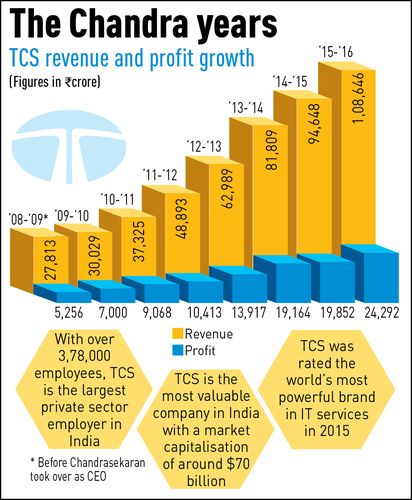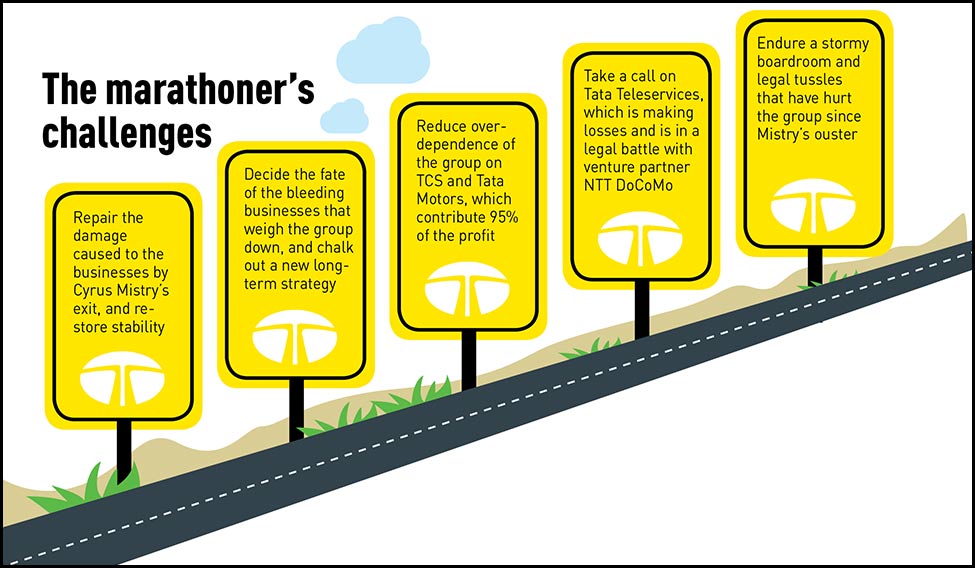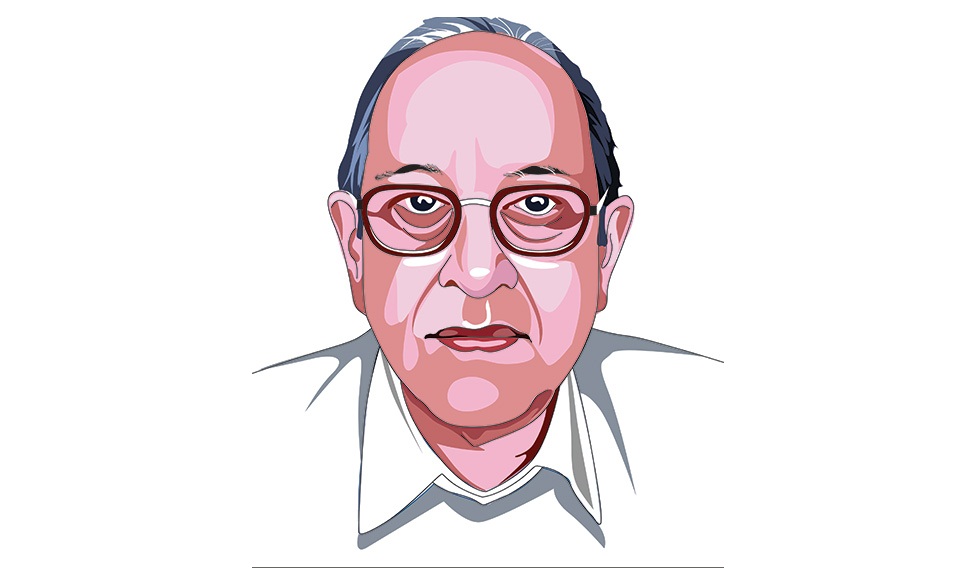What strengths does N. Chandrasekaran bring to his new position?
He has high credibility—within TCS, within Tata Group, within the international business community and with governments across the globe. This is a unique strength which, probably, no business leader in India has to the same extent.
He starts with the burden of big expectations. Your advice to him?
I would not presume to advise. Basically, companies that are not so profitable must start doing much better. Tata Steel UK, the telecom segment, the passenger car segment... these are large businesses just on the borderline. There are no quick solutions, but there is probably a way out. He will have to work that out himself, with the management of those companies.

Given the recent changes at the top management level, will he be able to create his own team?
He would have complete freedom to build the team he wants. One of his strengths in TCS was that he built very good teams. He knows that one cannot really achieve much in a group of this scale without a top class team.
Media reports suggest that Tata Trusts influence decision-making in Tata Sons.
Honestly, I do not see it as a problem. I am a nominee director in Tata Sons, on behalf of Tata Trusts. I would be expected to address the Trusts’ point of view, if any, at Tata Sons’ board meetings. I have never known Tata Trusts to take any interest in a commercial matter being considered by the board. In fact, the Trusts have never tried to run any of the businesses. An exception is the Welspun case, where a large acquisition was made by Tata Power without consulting Tata Sons. Other than that, I do not see scope for any problem. The Trusts’ concerns were primarily about governance and ethics.
Recent happenings have dented the image and standing of the group. What can Chandrasekaran do to reverse this, while the legal battle continues?
I do not think it is a serious injury by any standards. Chandra’s appointment itself will raise the image of the group, and morale within the group. Chandra’s style of functioning will be based very much on trust, I think. Combine that with maintaining good relations with the operating companies and promoters. That itself will be quite enough, I believe.
In TCS, Chandrasekaran was the boss. On the Tata board he is more like first among equals. It takes a different mindset to make your mark in that circumstance, doesn’t it?
In TCS, I am told that Chandra did not have an authoritarian mindset. He has been very consensual in his dealings with colleagues there. It will be pretty much the same across the group. People do look up to the chairman of Tata Sons as someone who comes to their assistance when it is needed. Chandra would be very mindful of the change that he would have to bring.
What, in your view, is his single biggest achievement at TCS?
To deliver those spectacular results year after year. Managing the scale and spread across various geographies. The consistently high ratings TCS got from its clients. Maintaining quality. To have low attrition despite a huge workforce. It is not visible, but it is an enormous skill.

Will he bring to Tata Sons some of the management and decision-making processes he set up in TCS?
Certainly. Many things need to happen within Tata Sons. Apart from the listed companies, there are countless unlisted entities under Tata Sons. There has been talk of consolidation, of forming clusters—this has not happened so far.
For instance, in the defence and aerospace cluster, we have four or five companies occupying the same space, and, at times, competing with each other. The time has come to consolidate them. The same could be said of retail units like Chroma and Trent. These are not very large businesses, but they are market leaders in a way.
These are some of the issues which will test the skills he displayed at TCS, and also what he has learnt of international practices. TCS has given him a unique overview on businesses globally. There is also the question of shutting down many small companies that do not seem to be doing anything particularly useful. One has to have a hard look at some of the businesses one is in.
For instance, the Tatas are getting into hi-tech areas. We do not speak about it much. For example, the aerospace capability within Tata Group is probably the greatest in the private sector in India. They will be making aircraft with Airbus for the Indian Air Force—for the first time outside HAL. Ratan Tata started these businesses. They are quite heavily into the development of UAVs for civilian and military use. TCS was involved in the nuclear submarine programme.
It is a call one has to take, whether or not to increase our investments in these areas. Much of ‘Make in India’ would be defence-related. It is a unique advantage. But, telecom does not occupy a significant space and has a large debt burden.
New leaders get a honeymoon period. But, it seems Chandrasekaran won’t have one.
There is absolutely no honeymoon period. Things have been at a standstill in Tatas for quite some time now. So, I don’t see a slow process at all. As he takes over, (and, I am sure he is being briefed on all this), he will realise that if it is slow it will not happen. To make things happen, you will have to move very quickly. Literally, each day. Certainly, he would be expected to show forward movement in all these problem areas within the next three to six months.





